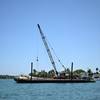Not in Compliance with Ballast Rules? You Will Pay
These regulations also increase the number of vessels subject to the reporting and recordkeeping provisions and expand the reporting and recordkeeping requirements on ships, increasing the Coast Guard’s ability to prevent the introduction of nonindigenous species as required by the Nonindigenous Aquatic Nuisance Prevention and Control Act and the National Invasive Species Act.
“The potential impacts of nonindigenous species on our environment, food supply, economy, health and overall biodiversity are universally accepted as significant and growing, and these regulations are part of the Coast Guard’s commitment to preventing the introduction of nonindigenous species into U.S. waters via ballast water.” said Capt. David Scott, Chief of the Coast Guard’s Office of Operating and Environmental Standards.
Proposed Coast Guard regulations for later this year will mandate ships coming from outside U.S. waters to take steps to eliminate nonindigenous species from their ballast water, and future regulations may outline specific ballast water discharge standards. Vessels are encouraged to electronically submit ballast water management reporting forms via e-mail and/or web-based methods available at the National Ballast Information Clearinghouse website: http://invasions.si.edu/NBIC/bwform.html
This final rule can be found at: http://dms.dot.gov. In this web site, proceed to simple search, and under docket number, enter 13147. For further information on this rule, please contact Mr. Bivan R. Patnaik at (202) 267-1744, [email protected].
· First, penalty provisions are clearly spelled out in both subparts C and D of 33 CFR Part 151 where violators of either the mandatory management requirements (for vessels bound for the Great Lakes or portions of the Hudson River) or the mandatory reporting and recordkeeping provisions (for all vessels bound for ports or places within the United States) would be liable for a civil penalty of up to $27,500 for each violation, with each day of a continuing violation constituting a separate violation. A person who knowingly violates either provision will be guilty of a class C felony.
· The second change would increase the number of vessels subject to the reporting and recordkeeping provisions of subpart D. This expansion of the reporting population was done in order to generate more data that will allow for a more thorough understanding of ballast water delivery and management practices and how these relate to invasions of non-indigenous species (NIS) from vessels' ballast water on both a national and regional basis. This information will provide a clearer picture of the realities of BWM and NIS invasions over time and lead to a more effective and efficient program.













